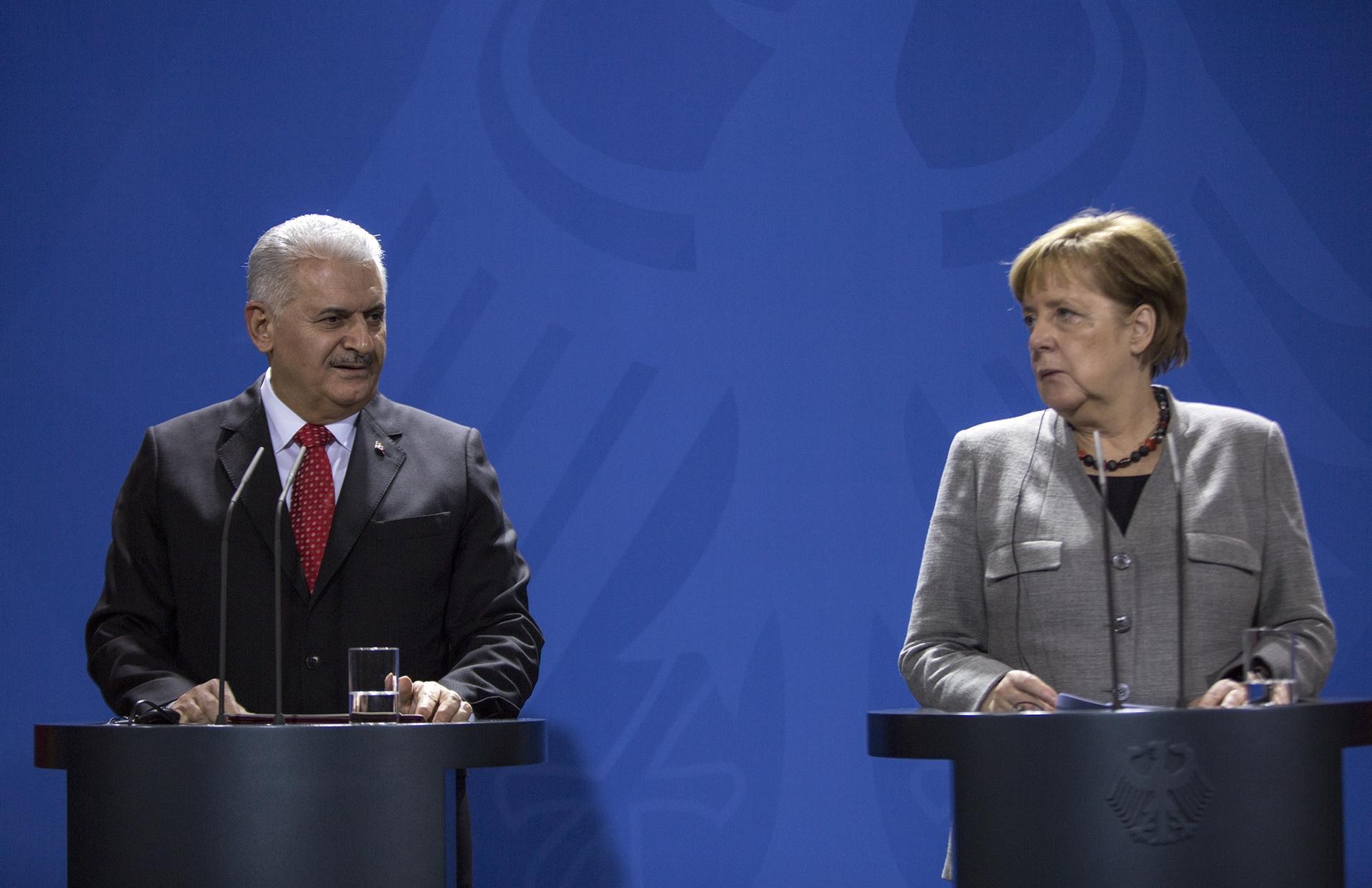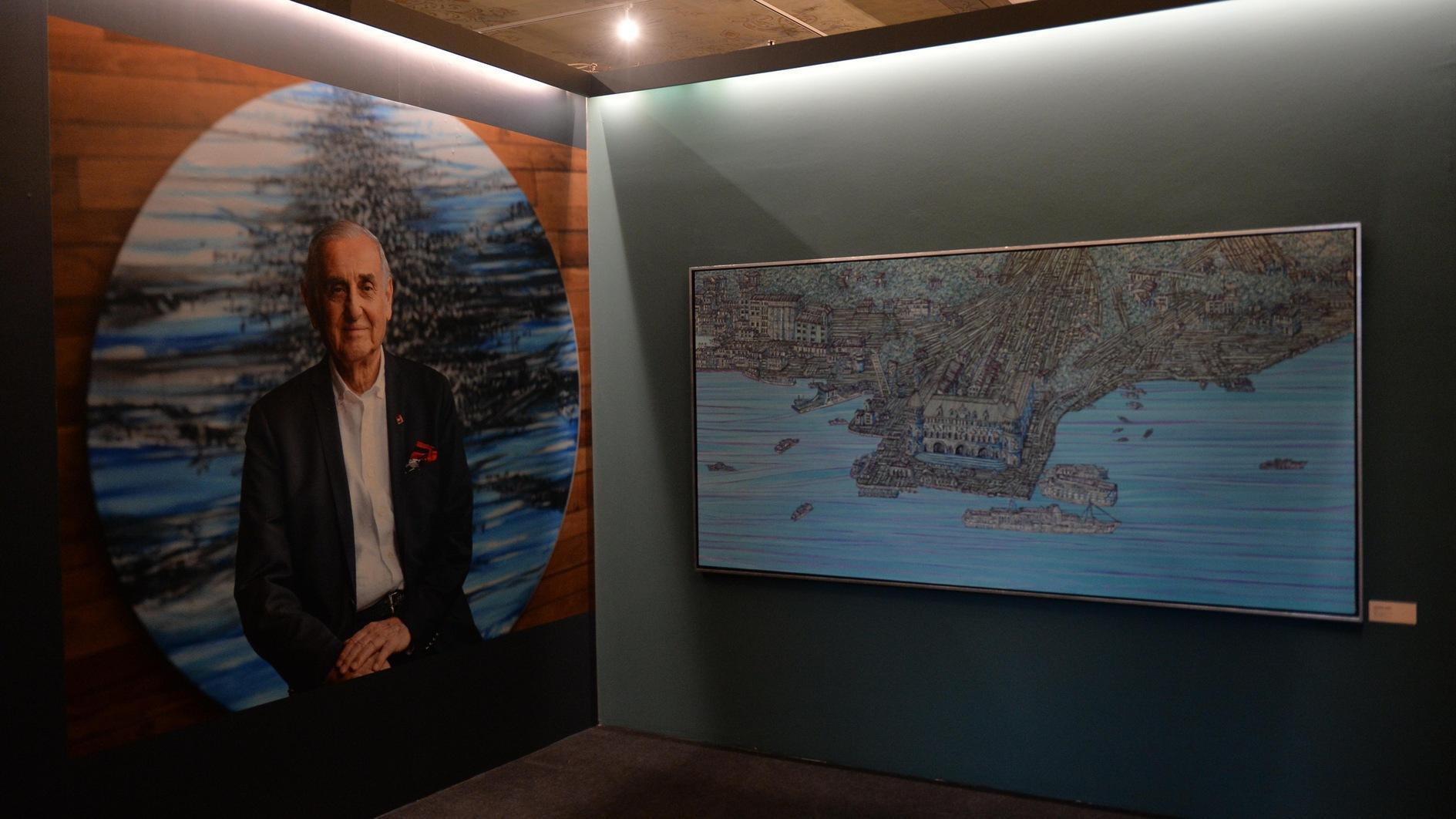Turkey, Germany vow to improve strained ties following Merkel-Yıldırım meeting
BERLIN/MUNICH

Turkish Prime Minister Binali Yıldırım and German Chancellor Angela Merkel vowed on Feb. 15 to improve strained ties between the two countries following months-long tensions between Ankara and Berlin.
Speaking at a joint news conference with Merkel in Berlin, Yıldırım called for an intensified dialogue and stronger solidarity in the fight against terrorism.
“The Kurdistan Workers’ Party [PKK] is a terrorist organization. The Syrian Kurdish Democratic Union Party/People’s Protection Units [PYD/YPG] is a terrorist organization,” he said.
“Whatever their names are, their main purpose is to violate peace in the region and create new troublesome fields,” said Yıldırım, adding that Turkey wants to see its allies’ support.
Yıldırım on Feb. 16 hinted at a new period of Turkey-Germany ties.
“Some troubles that previously marred Turkey-German relations seem to have been sorted out. We, from now on, will take steps to restore our relations and vice versa,” Yıldırım said to reporters in Munich on Feb. 16.
Yıldırım also said “zero-tolerance for terrorist groups” is crucial for improving Turkey-Germany relations. “We cannot be allies with countries in which the PKK or FETÖ [Fethullahist Terrorist Organization] are influential and prosperous,” Yıldırım said, adding that such a situation “would not befit Turkish-German relations.”
During his conference with Merkel on Feb. 15, Yıldırım also said the decisiveness shown by the West in its fight against the Islamic State of Iraq and the Levant (ISIL) should also be displayed in the battle against the PYD/PKK and the YPG.
The German chancellor welcomed the Turkish premier’s first visit to Berlin and backed the need for dialogue to improve ties.
“I believe that this visit is a signal, showing that both sides have an interest in improving German-Turkish relations,” Merkel said.
But she also acknowledged that difficult issues were on the agenda of bilateral relations.
“We must continue our intensive discussions,” Merkel added.
Turkey’s right to self-defense
Merkel also stressed Turkey’s right to self-defense, despite pushes from the opposition for the German government to exert more pressure on Ankara for the ongoing counterterrorism operation in the northwestern Syrian province of Afrin.
“Just like every country, of course Turkey has the right to pursue its security interests,” she said.
However, she voiced concerns over growing tensions between the NATO allies, the United States and Turkey, due to the Washington administration’s support for the YPG in northwestern Syria.
The German chancellor hoped Ankara and Washington would overcome their differences and reach an agreement.
Yıldırım underlined that the goal of Turkey’s “Operation Olive Branch” was not only to protect Turkish citizens, but also to secure NATO’s borders and prevent a huge refugee influx to Europe.
Yıldırım added that it had not been Turkey that had started the war in Syria but it is Turkey that continues to face its consequences and is sheltering 3.5 million refugees on its soil today.
‘Journalist Yücel case in line with law’
The court case involving German-Turkish journalist Deniz Yücel, who was jailed last year for allegedly spreading “terrorist propaganda,” has been continuing in accordance with Turkey’s principles of rule of law, the Turkish prime minister said.
Yıldırım said the Turkish courts had a heavy load due to cases linked to the defeated coup of July 15, 2016.
“The case of Deniz Yücel, like other cases, is continuing in accordance with the principles of the rule of law,” he said.
“Turkey faced a huge coup [attempt]. There are thousands of people in these coup-linked cases,” Yıldırım added.
“The courts are overloaded. There might be delays due to the workload. I hope that he [Deniz Yücel] will appear in court and that there will soon be a development,” he said.
Meanwhile, Germany wants a fast and fair judicial process that secures the release of Yücel, Merkel said.
“I have said during talks that we hope for a fast and constitutional [judicial] process for Deniz Yücel,” said Merkel.
Before the meeting, Yıldırım said he hoped Turkey and Germany would leave troubled issues behind and open a new page.
“We will discuss our bilateral ties, regional issues and EU matters in a substantive way with Chancellor Merkel. I hope we may leave troubled issues behind and open a new page,” Yıldırım said.
The prime minister said he had hopes Germany shared their will to enhance ties. “I think the new coalition government that emerged after elections shares this will,” he said.
Banning the activities and public events of PKK members in Germany is an important step, he acknowledged, calling this a step in the right direction for fixing ruined ties.
“We should not see Germany as Germany alone. It is the backbone of the EU. It is Turkey’s largest trade partner in the EU and our four million people are making a bridge between our countries. That is why downgrading ties between Turkey and Germany is illogical,” Yıldırım said.
Regarding Turkish-German journalist Deniz Yücel, the prime minister said the government has hopes Yücel will stand before the court as soon as possible, as every hearing has given hope for him to gain his freedom. “I think a development might be seen soon and this will no longer be an issue between Turkey and Germany,” he said.
The Die Welt reporter was arrested on charges of terrorism in February 2016. He has been in prison for more than a year and has not yet been indicted.
In an interview with the BBC on Feb. 14, Yıldırım said the city center of Afrin is “surely” included in the areas for the Turkish military operation.
“Of course [the military will enter the Afrin city center]. So, you clear the countryside ... If terror elements remain [in the city center] you will have failed the objective,” he told the British broadcaster in a sit-down interview.
“[The accusers] are looking in the wrong direction for civilian deaths,” the prime minister said, answering questions on whether there have been civilian deaths since Turkey’s military operation has begun.
Turkey launched “Operation Olive Branch” on Jan. 20 to clear People’s Protection Units (YPG) militants from Afrin.
















